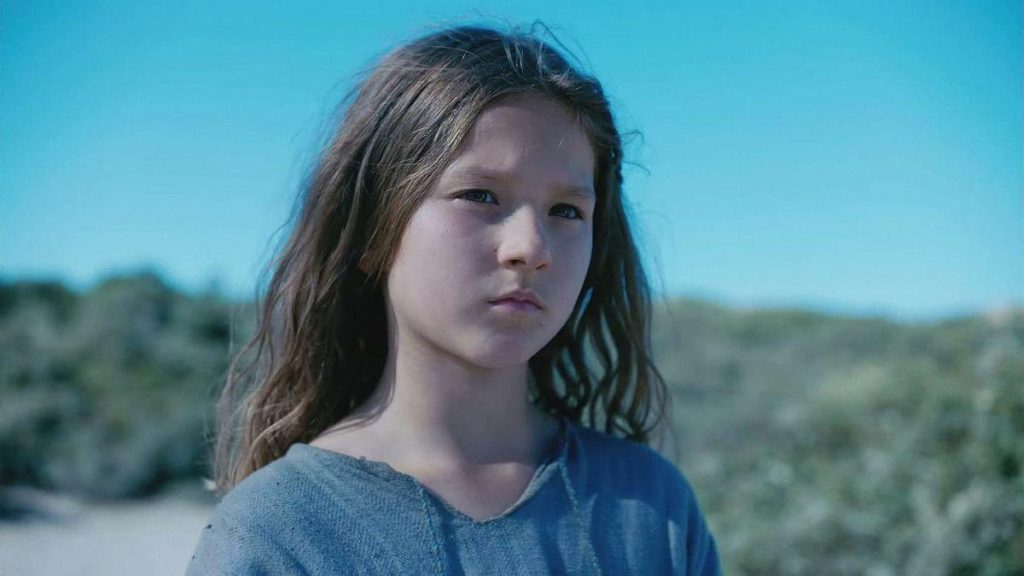
It would be difficult to overstate the weirdness of this film, but the oddity of the following sentence is some indication of what you’re in for: Adapted from the writings of the French Catholic poet Charles Péguy, Bruno Dumont’s unclassifiable theological rock musical blends theodicy and mystical soteriology with musical textures ranging from Baroque themes to electronica and thrash metal.
Belying Dumont’s bizarre eclecticism, on the other hand, is the naturalism of the opening sequence, in which a 9-year-old Jeannette wanders the countryside singing a capella, offering prayers to her patron saint John and the Holy Trinity, as a pious young peasant girl might do—except that the words of the Lord’s Prayer are subverted into an unsettling elegy: “Our Father who art in heaven / Your name is so far from being hallowed / And your reign from coming …” Over and over young Jeannette returns to the haunting refrain, “And there is nothing; there is never anything.” Like many sensitive children, the saint-to-be is deeply troubled by suffering, war, and the damnation of souls: a state of affairs that she can’t see has been at all mended by 14 centuries of Christianity. Did Jesus die in vain, then?
These scrupulous concerns are cross-examined in two directions. On the one hand, Jeannette’s “realistic” friend Hauviette asks: Why carry the weight of the world on your shoulders? Do your best and hope for the best; trust God and don’t ask him to justify himself, since we can’t anyway. This is, really, the kind of pragmatic common sense that most conventionally religious people bring to such questions—but Jeannette can’t be satisfied with this. Instead, the answer for a saint comes is a breathtaking 18-minute sequence at once sublime and at least bordering on ridiculous. A character called Madame Gervaise, a Franciscan nun whose characterization in Péguy’s work varied significantly over time, appears to Jeannette, played without explanation by stone-faced twins (Aline and Elise Charles), who proceed to propose a transcendent theological vision in song.
This vision consists of an uncompromising restatement of the problem of evil, countered by a poetic vision of time from the perspective of eternity. On the one hand, the earth is full of suffering and profaning of holy things—and all of us, even the best among us, are complicit cowards and liars who allow sinners to damn themselves. All love and friendship are false and we are all alone (though in spite of our inability to love we somehow love anyway). On the other hand, the creation of the world and the redemptive sacrifice of Christ are not vanished, past realities, but pervade all of time and space: every parish and village, especially in the even-present offering of the Paschal mystery, yet also embracing the non-Christian world, which is in some way Christian, too. Redemption—true, eternal happiness—are present realities; though non-Christians and even Christians may not understand it, we do not wait for happiness, but possess it now.
The gravity with which the sisters intone Péguy’s poetry, with its chant-like reliance on simplicity and repetition, gives this sequence a semi-liturgical feel. There is also, of course, an undeniable element of humor in the dissonant musical styles—from the eclecticist Gautier Serre, credited as Igorrr—veering from a capella to classical guitar to guitar-shredding rock, with Jeanette and the twins (briefly doffing their wimples) solemnly flailing their long tresses like medieval headbangers. Yet it never dissolves into camp or burlesque. On the contrary, the simple, solemn dance sequences become a kind of prayer, the craziness held together by the naturalistic foundation of the opening scenes and the live recording of the singing.
The film’s second half finds Jeanne, now about 15, wrestling with obstacles she has faced and concerns about lying to her parents about her divine calling and the emotional upheaval about leaving home to go to war, escorted by her unassuming young uncle (a hilariously low-key Nicolas Leclaire, who raps all his songs and dabs through his improvised dance moves). This material appears to be based more on Péguy’s 1897 work Jeanne d’Arc, written as an atheist, while the more transcendent first half relies more on Péguy’s 1910 Mystery of the Charity, written after his religious conversion. At times the second half feels overly repetitive, though it remains agreeable and often moving.
– Steven D. Greydanus (2022)
- Directed by: Bruno Dumont
- Produced by:
- Written by:
- Music by:
- Cinematography by:
- Editing by:
- Release Date: 2018
- Running Time: 105
- Language: French
Arts & Faith Lists:
2018 Ecumenical Jury— #8
2022 Top 25 Movie Musicals — #20